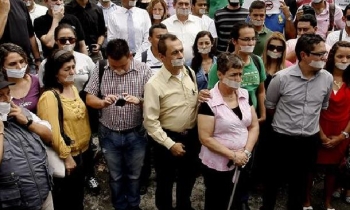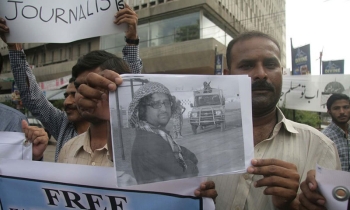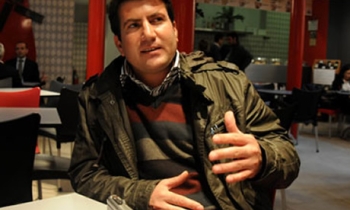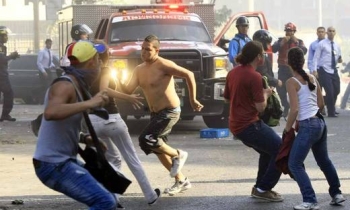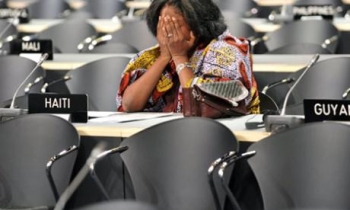Seventeen German journalists are under investigation in the alleged leak of classified documents given to a parliamentary committee. The documents related to a parliamentary inquiry into possible German government complicity in CIA prisoner flights and the detention of two men.

The president of the German parliament, Norbert Lammert, had sought charges against the journalists in June, senior prosecutor Simone Herbeth said, adding that an unidentified number of members were also under investigation, the Associated Press (AP) reported. "There is also an investigation in the direction of those entrusted with official secrets," Herberth said. "MPs are also being looked at."
Prosecutors in Berlin confirmed that an undisclosed number of journalists were under investigation for breach of secrecy. Germany's ARD television network, which first broke the story, said 17 journalists were involved, according to Deutsche Welle.
ARD said the probe was launched after complaints by the head of the parliamentary investigating committee, Siegfried Kauder, that classified information was being leaked to the press. The panel "had more holes than a Swiss cheese," Kauder told ARD. "You could read more from the classified documents in the press than what was available to the committee," he said.
The panel was set up in April 2006 to look into whether German intelligence services had violated human rights in the fight against terrorism, and what role the government played. The focus of attention was on the foreign intelligence service BND and its involvement with the US Central Intelligence Agency at the start of the Iraq war in March 2003.
The president of the Federal Association of German Newspaper Publishers criticised the investigations."It is not acceptable that journalists who are reporting about possible misdoing or errors have to fear persecution for giving away official secrets," Helmut Heinen said.

The head of the German Journalists Association (DJV), Michael Konken, called the investigation "a frontal attack on press freedom." The aim was to "intimidate journalists and their informants," he told ARD.
The channel said journalists from many of Germany's leading publications, including news magazine Der Spiegel, weekly Die Zeit and dailies Süddeutsche Zeitung, Frankfurter Rundschau, die tageszeitung and Die Welt were under investigation by prosecutors.
"Clarity must be established through legislation," said Green party chief Reinhard Bütikofer on ARD television. "It cannot be that journalists who do their duty — exposing that which possibly shuns the public light — may then later be prosecuted." Bütikofer's party vetted a bill on the topic last year, but it was quashed in May by votes from parliamentarians from Germany's ruling coalition of Christian Democrats and Social Democrats, Deutsche Welle reported.
“We are worried by the fact that the work of a large number of journalists is being called into question,” Reporters sans Frontières (RSF) said. “These journalists should under no circumstances be treated like criminals. It is the duty of the media to investigate and report all news and information of general interest. This is why it is fundamental that the confidentiality of sources, one of the pillars of investigative journalism and press freedom, should be effectively protected by the legislature.
“We are all the more surprised by this decision as the German constitutional court in February condemned a search of the magazine Cicero that was carried out after it published leaked confidential information. The court pointed out that press freedom is enshrined in the constitution and that it ruled that ‘searches and seizures in an investigation against members of the press are illegal if their sole or main aim is to identify a source.’ At the time, RSF had proposed that article 353b of the criminal code concerning ‘complicity in divulging a state secret’ should not apply to journalists.”

The International Federation of Journalists (IFJ) and its regional group, the European Federation of Journalists have fiercely condemned the preliminary proceedings against the journalists. IFJ and EFJ joined their German affiliates, the Deutscher Journalisten Verband and Deutsche Journalisten Union in ver.di, in criticising this move. According to EFJ/IFJ, this contradicts the recent judgement by the German Federal Constitutional Court in the case of Cicero, and therefore is "constitutionally inadmissible."
“This series of investigations is one of the most profound attacks on protection of sources there has been in Europe. This is a serious set-back,” said EFJ Chair Arne König. “The fact that it takes place in Germany, with their traditional respect for press freedom is most worrying. Especially German politicians should know better that protection of sources is an essential part of press freedom.”
According to the Association of German Journalists (DJV), there have been a total of 180 legal proceedings against journalists for “complicity in betraying a state secret” since 1986.

